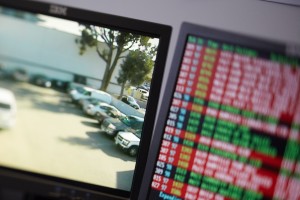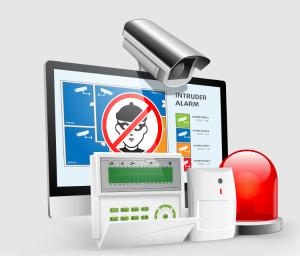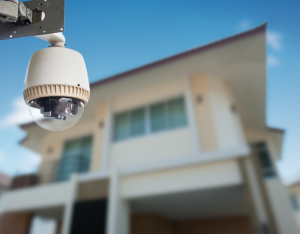Is a video surveillance system right for your business? Whether a company is large or small, video surveillance can enhance current security, protect valuable assets and employees, and improve and increase productivity. From evaluating your business’s needs to selecting system features, here are some tips on how to determine if a video surveillance system is right for your business.
 First, it’s important to understand the three basic components of every video surveillance system:
First, it’s important to understand the three basic components of every video surveillance system:
- Cameras – The number of cameras in the system, as well as their style and features, will depend upon your company’s needs and budget. Most cameras are either dome or bullet-shaped. Optional features include high or low definition, adjustable or wide angle lens, and built-in infrared illuminator.
- Recorder – The brains of the operation, it’s essentially a computer and a hard drive that records what the cameras see. Standard recorders usually store one week’s worth of footage. Newer systems usually have applications for smart phones.
- Monitor – This is how you or your security provider views the recorder’s footage. Depending on the system, footage can be viewed locally on a computer and/or off-site from a remote location.
Next, determine whether you want to place the cameras inside and/or outside of the building or office.
 The primary purpose of outdoor surveillance is to see suspicious behavior (such as who’s driving around the area) and to deter and/or identify and prosecute intruders. The cameras can either be very discrete or extremely obvious. When placed strategically, they can monitor one specific area (like the front door) or watch the whole building. Most outdoor cameras are waterproof and built to withstand the elements.
The primary purpose of outdoor surveillance is to see suspicious behavior (such as who’s driving around the area) and to deter and/or identify and prosecute intruders. The cameras can either be very discrete or extremely obvious. When placed strategically, they can monitor one specific area (like the front door) or watch the whole building. Most outdoor cameras are waterproof and built to withstand the elements.
An indoor system usually works best for monitoring productivity, protecting employees, guarding against theft and identifying wrongdoing. Indoor cameras can monitor multiple rooms or just one area, be motion-sensitive and generally produce a higher quality image.
Surveillance systems also offer a host of features and options. The following are some additional terms and options you may encounter:
- Wired versus wireless – A system that’s connected to your wireless internet can offer more flexibility and the cameras are generally more discrete. However, interruptions to your internet service can affect the signal. Wired cameras may take more work to install but can offer higher quality picture and more reliable service.
- Color and resolution – While color cameras can be useful for certain businesses or commercial properties, a good quality, black-and-white camera image can also identify an intruder or thief. For outdoor systems, you may want to look for a camera that offers an infrared illuminator for low light situations such as nighttime.
- Coverage – The amount of area a camera lens can cover varies greatly. Some cameras only shoot directly in front of the lens. Wide-angle lenses cover a larger space, while pan-tilt-zoom cameras can view up to 360 degrees. For outdoor cameras, choose an automatic iris, which automatically adjusts to different levels of light.
For more information on our business video surveillance systems or to get a free estimate, give us a call at (925) 932-2211 or (800) 273-2680.
Denalect Alarm is proud to serve home alarm and business security and alarm systems in Northern California: Antioch, Blackhawk, Concord, Danville, Dublin, El Cerrito, Hercules, Lafayette, Livermore, Martinez, Moraga, Oakley, Orinda, Pittsburg, Pleasant Hill, Pleasanton, San Ramon and Walnut Creek.



